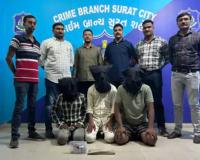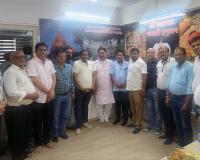Key Meeting Held Between FOSTTA and Railway Officials to Boost Railway Transport for Surat’s Traders

Surat: A crucial meeting took place today between the Federation of Surat Textile Traders Association (FOSTTA) and railway officials to discuss ways to increase the use of railway transport for traders in Surat. The meeting was attended by key railway officials, including Dr. Manoj Barhat (IRTS), Area Railway Manager of Valsad Subdivision, Saurabh Kumar (IRTS), Divisional Commercial Manager, Mumbai, and Mukesh Singh, Area Officer, Surat.
FOSTTA President Kailash Hakim highlighted the importance of efficient transport solutions for the textile industry in Surat, which trades extensively in fabrics, zari, and yarn across various parts of the country. He emphasized that while most goods are currently transported by road, using railways could save both time and money for traders as well as for the railways.
However, traders have raised several concerns with FOSTTA regarding railway transport. Compared to last year, there has been a significant drop in the volume of parcels sent via rail from Surat to other states. Last year, 68 goods trains and 124 passenger trains (with dedicated parcel coaches) facilitated the movement of goods worth approximately ₹700 crore from Surat. This year, only 26 goods trains and 49 passenger trains have been used, reducing the trade value to ₹300 crore.
During the meeting, traders pointed out specific challenges with railway transport:
1. Lack of GPS tracking: Traders are unable to track their parcels, leading to uncertainty about when and where their goods will arrive.
2. Coordination issues between Western and Eastern Railways: Inconsistent handling of goods when transitioning between railway zones has caused delays and inefficiencies.
3. Challenges at Varanasi Station: Goods arriving from Surat are often held at Platform No. 9, and local traders face significant labor costs and logistical challenges to transport parcels to Platform No. 1.
4. Space constraints at Surat station: The traders suggested creating a designated area for goods storage at Udhna station, along with opening a dedicated parcel booking office there.
5. Technological upgrades: FOSTA proposed using technology to improve transport solutions, such as implementing “Ro-Ro” ferry services, allowing trucks to be transported directly on goods trains, streamlining the process.
Railway officials acknowledged these concerns and provided updates on the current situation. They mentioned that goods trains are already operational from Surat to locations such as Varanasi, Muzaffarpur, Bhagalpur, Danapur, and Bengal, with plans to introduce services to more destinations soon.
The meeting was attended by FOSTA directors, members of Surat Goods Transport, and prominent traders from the local market, all working towards improving the logistics framework for Surat’s thriving textile industry.






